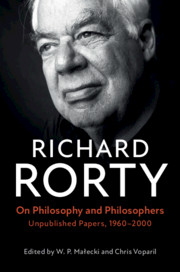Book contents
- On Philosophy and Philosophers
- On Philosophy and Philosophers
- Copyright page
- Contents
- Acknowledgments
- Note on Sources
- Introduction: Rorty as a Critical Philosopher
- I Early Papers
- II Later Papers
- 9 Philosophy as Epistemology: Reply to Hacking and Kim
- 10 Naturalized Epistemology and Norms: Replies to Goldman and Fodor
- 11 The Objectivity of Values
- 12 What Is Dead in Plato
- 13 The Current State of Philosophy in the United States
- 14 Brandom’s Conversationalism: Davidson and Making It Explicit
- 15 Bald Naturalism and McDowell’s Hylomorphism
- 16 Reductionist vs. Neo-Wittgensteinian Semantics
- 17 Remarks on Nishida and Nishitani
- Index of Names
13 - The Current State of Philosophy in the United States
from II - Later Papers
Published online by Cambridge University Press: 10 October 2020
- On Philosophy and Philosophers
- On Philosophy and Philosophers
- Copyright page
- Contents
- Acknowledgments
- Note on Sources
- Introduction: Rorty as a Critical Philosopher
- I Early Papers
- II Later Papers
- 9 Philosophy as Epistemology: Reply to Hacking and Kim
- 10 Naturalized Epistemology and Norms: Replies to Goldman and Fodor
- 11 The Objectivity of Values
- 12 What Is Dead in Plato
- 13 The Current State of Philosophy in the United States
- 14 Brandom’s Conversationalism: Davidson and Making It Explicit
- 15 Bald Naturalism and McDowell’s Hylomorphism
- 16 Reductionist vs. Neo-Wittgensteinian Semantics
- 17 Remarks on Nishida and Nishitani
- Index of Names
Summary
“The Current State of Philosophy in the United States“ begins by asking why the sense of crisis prevalent within the contemporary humanities seems absent from American philosophy departments. Rorty proposes that this is because these departments are largely analytic and analytic philosophy does not consider itself a humanistic discipline. He then traces that view to the logical positivists’ attempt to put philosophy on the secure path of a science by developing a rigorous method of conceptual analysis. He argues that while the project of conceptual analysis had collapsed, analytic philosophy retained a sense of being a science and its sense of superiority to other traditions in philosophy and other humanistic fields. Finally, he proceeds to show some negative consequences of the dominance of this model in American philosophy departments by comparing analytic philosophy with continental philosophy and putting it in a larger academic and social context. Among the consequences are a growing isolation from other academic fields, as well as the insufficient attention analytic philosophy gives to philosophy written in languages other than English, to the history of philosophy, and to questions of social justice.
- Type
- Chapter
- Information
- On Philosophy and PhilosophersUnpublished Papers, 1960–2000, pp. 195 - 202Publisher: Cambridge University PressPrint publication year: 2020



